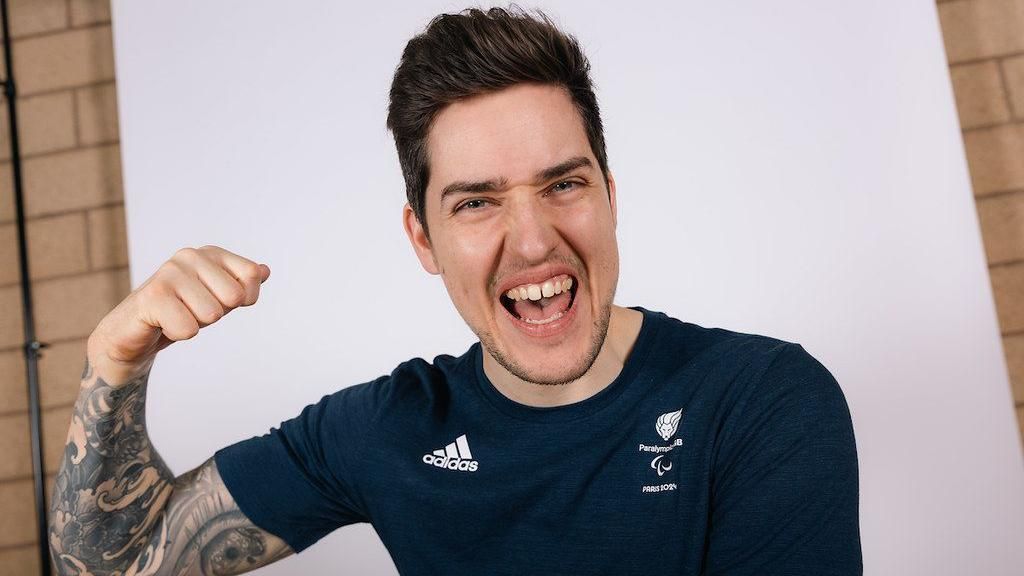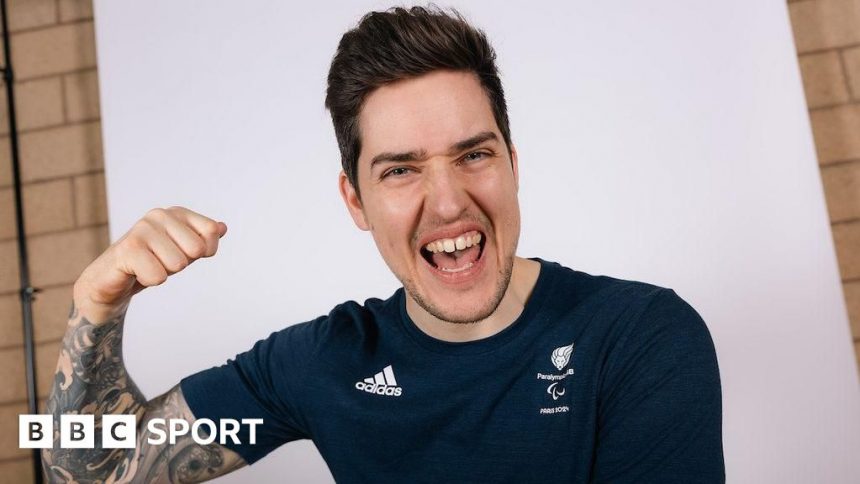‘I never blamed rugby for my injury’ – David Ross

Ross will make his Paralympics debut in Paris
-
Published
“I remember having a conversation with my mum at a point and she said ‘do you think you’re flogging a dead horse here?’ I just said no. I knew I had the chance to do this if I got a clean run at things.”
Having first became involved with Great Britain’s wheelchair rugby squad during their preparations for the Rio Paralympics, David Ross has had to wait two cycles to finally make his bow at the Games but, before tomorrow’s competition beginning in Paris, the 29-year-old never considered drawing a line under his time on the court.
Indeed, even had his international career not ultimately bore fruit, the County Down man knows he would still be involved in some capacity in a sport he says helped him “regain that little bit of normality” after a life-changing injury sustained in a schools rugby game eleven years ago.
Ross was representing Wallace High in February of 2013 when he was trapped underneath a collapsed ruck, the incident causing an injury that left the then 18-year-old paralysed from the neck down.
He was still coming to terms with the reality that he would spend the rest of his life in a wheelchair when a chance encounter introduced him to the sport in which he will become a Paralympian.
“I’d have trained pretty hard at school, looked after what I was eating,” he told BBC Sport NI.
“I met a [wheelchair rugby player] Will in rehab one day and he had a KFC with him. He said to me, ‘If my coach knew I was eating this, he’d kill me’ and that line, it was like a lightbulb in my head – ‘That’s what I used to do, that’s what I need to do, I can still do that’.”
‘Sport had to become part of my life again’
Having sustained such an injury through rugby, some would expect Ross to have turned his back on the game. Instead, it was quite the opposite. He had watched the 2013 Six Nations from his hospital bed and having a ball in his hands again instantly felt natural.
“I was always very sporty growing up, I dipped my toe in everything that I could,” he said.
“I settled on rugby when I got to high school and played from first year of high school, all the way to when I got injured.
“It was a life-changing injury but sport was always a part of my life and for me to regain that little bit of normality, sport had to become part of my life again.
“I never blamed rugby for my injury and from the first session [of wheelchair rugby], I didn’t even try any other sports. I knew it was the one for me.”
A natural athlete, Ross took so quickly to the new sport that he was included in Great Britain’s wider squad in 2015, although he would miss out on inclusion for Rio when the panel was pared down prior to their travelling to Brazil.
‘Things come good in time’
As attention turned to Tokyo, Ross’ efforts to make it to Japan were hampered by both the Covid pandemic and him still being based in Belfast while he finished his degree in Sport and Exercise Science at the University of Ulster.
Knowing that he “wasn’t ready” in 2016, to then miss out on the delayed Games in Tokyo naturally raised doubts among those closest, but his own belief did not waver.
“To get that taste for it gave me that hunger to kick on and get to where I am now,” he said.
“I remember having a conversation with my mum at a point and she said, ‘Do you think you’re flogging a dead horse here?’ I just said no. I knew I had the chance to do this if I got a clean run at things.
“Yeah, there were times when I missed out on selection for tournaments when I was first back on the scene, but you have to trust the process and keep doing the work.
“Things come good in time. I’ve been one of those players who has had to work hard in the background to get their chance and I’m getting it now.”
Great Britain beat the USA in the gold medal match at the Tokyo Games
Moving to London in 2019 would prove a catalyst for Ross to realise his international ambitions. Living with his brother and able to train nearby, for the first time since his injury he was fully ensconced in a sporting environment, no longer needing to spend the early parts of meet-ups at the National Sports Centre getting back up to speed.
Having for so long felt his progress was “two steps forward, one step back”, he would make his debut for Team GB in 2022 and, along with fellow newcomers Kieran Flynn, Dan Kellett, Ollie Mangion and Tyler Walker, will join a ParalympicsGB squad aiming to repeat as gold medallists – something that would be a first for any European team.
“There’s history to be made but we’ve got games to play first to get there,” added Ross.
“The lads last time went out and won a gold medal but this is a new team. We’ve a changed squad, there’s five guys making their debut, we’ve a new assistant coach.
“We’re our own team with our own goals and aspirations, our own potential. We just have to go out there and do our best to realise that.”






